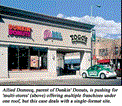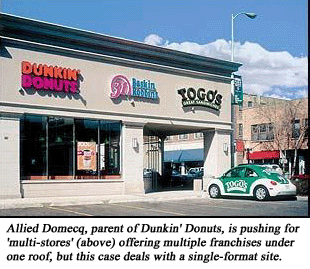Legal Brief: Dunkin' Donuts Part One—It's da franchisee's default

When a Dunkin' Donuts franchisee couple fell behind rent and other payments in excess of $40,000—and failed to come up with a credible reason why—Dunkin' closed them down.
Contents
Franchise agreement spells out fees
Franchisees default amid ‘confusion'
Franchisees default amid ‘confusion'
December 2000: Judge finds in favor of Dunkin' Donuts
Dunkin' Donuts recently went to court to close down a Philadelphia franchise for non-payment of $46,257.50 in fees and rent. Dunkin' Donuts is a Delaware corporation with its principal place of business in Randolph, Massachusetts, home of quick-serve restaurant parent company Allied Domeq.
Dunkin' Donuts grants franchises to independent franchisees who operate Dunkin' Donuts shops throughout the United States and around the world. Dunkin' Realty is a wholly-owned subsidiary of Dunkin' that leases properties to Dunkin's franchisees.

The general public knows and recognizes Dunkin' Donuts marks, and associates them exclusively with that brand name by virtue of standards used by the 3,700 U.S. and 4,700 global (as of December, 2000) franchisees. The franchisee license entitles them to use the trade name, service marks and trademarks of Dunkin' Donuts in the operation of these shops. Franchisees also use specialty equipment, distinctive interior and exterior accessories, identification schemes, products, management programs, standards, specifications, proprietary marks and information.
Franchise agreement spells out fees
On March 31, 1995, Mr. Guang Chyi Liu and Ms. Susan Yeh Liu and G.C.S.L. Co., Inc. (the Liu's) obtained a Dunkin' Donuts franchise in Philadelphia, Pennsylvania. As franchisees, the Liu's were granted a license to use the company's trademark. In return, the Liu's were obligated to pay certain fees to Dunkin'.
According to their Franchise Agreement, the Liu's were required to pay:
(1) weekly franchise fees of 4.9% of their gross sales;
(2) weekly advertising fees of 5.0% of their gross sales; and
(3) interest on unpaid fees.
Failure to make these payments in a timely manner would constitute a default under the Franchise Agreement. In the case of such a default, Dunkin' (referring to the company and its realty business) was required to give the Liu's written notice and a seven day "cure period" within which to cure the default. Failure by the Liu's to cure the default before the expiration of the cure period would allow Dunkin', upon written notice, to terminate the Franchise Agreement.
The Franchise Agreement also contained many provisions relating to the continued use of trademarks after its termination. Specifically, the Franchise Agreement provided that:
(1) "Upon any termination or expiration of this Agreement . . . Franchisee shall immediately cease to use . . . any methods associated with the name "Dunkin' Donuts," any or all of the Proprietary Marks of Dunkin' Donuts.")
(2) "Any unauthorized use or continued use after the termination of this Agreement shall constitute irreparable harm subject to injunctive relief"; and
(3) "Continued use by Franchisee of Dunkin' Donuts' trademarks, trade names, Proprietary Marks, and service marks after termination of this Agreement shall constitute willful trademark infringement by Franchisee."
On March 31, 1995, the Liu's also obtained a lease to the property on which their franchise was located.Dunkin' Realty acted as the landlord. According to the lease, the Liu's agreed to pay the following amounts to Dunkin' Realty:
(1) monthly rent of $ 7,812.50;
(2) annual "percentage rent" in the amount by which twelve percent of the gross annual sales of their shop exceeded a specified annual base rent and
(3) all real estate and other taxes relating to the premises, to be paid in monthly installments of 1/12 of the estimated annual real estate tax.
If the Liu's failed to make a timely payment, Dunkin' Realty could provide them with a written Notice to Cure. Failure to cure the default within ten days of such notice would entitle Dunkin' Realty to terminate the lease. Dunkin' Realty could also terminate the Lease if the Franchise Agreement were terminated.
Franchisees default amid ‘confusion'
As of June 21, 2000, the Liu's owed Dunkin' and Dunkin' Realty total of $43,161.99. Of this total, $13,654.07 was for a year-end percentage rent charge under the Lease. Despite paying this amount in years past, and receiving an invoice in April, 2000 that explained the calculation of this charge, the Liu's claimed that they were confused as to the source of this fee.
The Liu's also claimed to have serious difficulty speaking English or understanding simple business transactions. However, it turned out that Ms. Liu had been employed as a full time nurse for fourteen years, was certified in oncology, and did not need an interpreter while at work. Mr. Liu was a doctoral candidate at the University of Pennsylvania prior to their purchase of the Dunkin' Donuts franchise.
On June 22, 2000 Dunkin' promptly sent the Liu's a Notice of Default and Notice of Cure letter. However, according to Dunkin, the Liu's did not cure the defaults. The Liu's claimed to have sent checks to Dunkin' in May, 2000. However, following Dunkin's standard business practice, the Liu's would always send their checks to a lockbox in North Carolina, from which the checks would be deposited in a bank within twenty-four hours of their receipt. Dunkin's bank did not receive the checks, dated May, 2000, until late in July.
By July 10, 2000 the Liu's deficiencies had grown to $46,257.50 and on July 12, 2000, Dunkin' sent the Liu's a Notice of Termination of their Franchise Agreement with Dunkin' and their lease with Dunkin' Realty.
Lawsuit follows refusal to close shop
The Liu's refused to accept the termination of the Franchise Agreement and Lease, and continued to hold themselves out to the public as Dunkin' franchisees. Dunkin' then filed a lawsuit against the Liu's alleging breach of contract, trademark infringement and unfair competition.
On July 20, 2000, Dunkin' asked the magistrate judge to stop the Liu's from further use of the Dunkin' Donuts trademarks and trade names and require them to vacate their franchise property while the lawsuit was pending.
After conducting hearings, the Honorable Magistrate Judge Thomas J. Rueter decided in Dunkin's favor.
On December 11, 2000 the Liu's filed an objection to the magistrate's decision in the U.S. District Court For The Eastern District Of Pennsylvania.
December 2000: Judge finds in favor of Dunkin' Donuts
Based on the evidence in the case and the legal precedents, the district court upheld the magistrate judge's decision. On December 21, 2000 the district court ordered the Liu's to "cease all use of Dunkin' Donuts proprietary marks and information and any methods associated with the name "Dunkin' Donuts" no later than twenty (20) days from the date of this Order [December 21, 2000]."
The district court also ordered the Liu's to " deliver possession of the premises 5100 City Line Avenue, Philadelphia, Pennsylvania 19145, to an authorized representative ofŠ Third Dunkin' Donuts Realty, Inc., no later than thirty (30) days from the date of this Order [December 21, 2000].
Source: Dunkin' Donuts v. Guang Chyi Liu, 2000 U.S. Dist. LEXIS 18388 (United States District Court For The Eastern District Of Pennsylvania) (December 21, 2000)
Published as an ongoing series by VerticalNet, Inc.© and Ornel, Inc©. Ornel Inc. (www.ornel.com), producers of CourtCases.net (www.courtcases.net).
